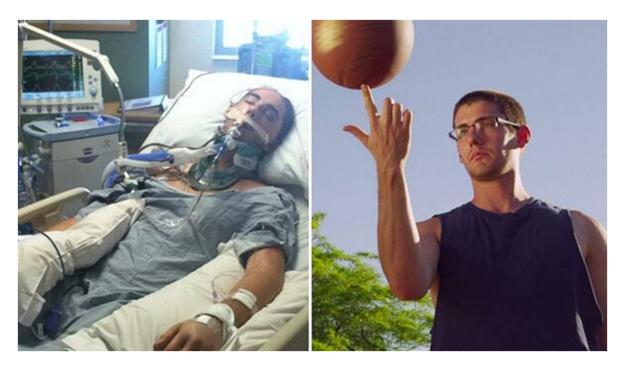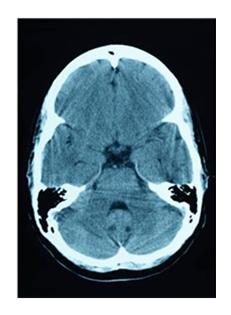 21-year-old Sam Schmid had just finished coaching a basketball team at his former school. He was driving his Jeep when a van crossed into his lane, causing his vehicle to go airborne. Sam suffered critical head injuries so severe that he had to be airlifted from the local hospital to St. Joseph’s Medical Center in Phoenix, AZ. Although he received surgery for a life-threatening brain aneurysm, his prognosis was grim. Thought to be brain dead, hospital personnel began palliative care and discussed organ donation with his parents. They contemplated taking Sam off of life support. But much to the surprise of everyone, he began to respond. In an act that defied explanation, Sam held up two fingers. That simple motion quite possibly saved his life. Sam has since gone on to experience a miraculous, yet undoubtedly challenging, recovery process. Now, just two years later, he’s enrolled in college and is even back on the basketball court.
21-year-old Sam Schmid had just finished coaching a basketball team at his former school. He was driving his Jeep when a van crossed into his lane, causing his vehicle to go airborne. Sam suffered critical head injuries so severe that he had to be airlifted from the local hospital to St. Joseph’s Medical Center in Phoenix, AZ. Although he received surgery for a life-threatening brain aneurysm, his prognosis was grim. Thought to be brain dead, hospital personnel began palliative care and discussed organ donation with his parents. They contemplated taking Sam off of life support. But much to the surprise of everyone, he began to respond. In an act that defied explanation, Sam held up two fingers. That simple motion quite possibly saved his life. Sam has since gone on to experience a miraculous, yet undoubtedly challenging, recovery process. Now, just two years later, he’s enrolled in college and is even back on the basketball court.
This case is just one example that raises serious questions surrounding the definition and diagnosis of “brain death.” Are there doctors who exploit the line between life and death? How does organ donation play a role?
Historically, the prevailing determination of death was the cardiopulmonary standard, which is defined as the irreversible loss of heart and lung function. In 1968, the Report of the Ad Hoc Committee of the Harvard Medical School to Examine the Definition of Brain Death was published in the Journal of the American Medical Association. It ushered in the first introduction of “brain death” as a determination of death. It was no coincidence that this coincided with the advent of technology that enabled the first transplants of vital organs. The 1968 report actually stated that the previously established criteria for death were “obsolete” and that it was a contributing factor to the shortage of organs available for transplant.

In 1981, the National Conference of Commissioners on Uniform State Laws, American Medical Association, American Bar Association and President’s Commission for the Study of Ethical Problems in medicine and Biomedical and Behavioral Research drafted a state law called The Uniform Determination of Death Act. It further described “brain death” as the “irreversible cessation of circulatory and respiratory functions, or the irreversible cessation of all functions of the entire brain, including the brain stem.” Many states have since adopted it as a guide for determining death.
The criteria for “brain death” varies by state, however there are general evaluations that physicians typically perform. These include: eye response to light; gagging and swallowing reflexes; and the ability to breathe without a ventilator. It is also critical that the doctor determines there are no other contributing factors such as drugs that can be anesthetizing or paralyzing the patient because these can often mimic symptoms of “brain death.”
The debate ensues because the current criteria for brain death are not infallible. There are other functions of the brain stem that are not accounted for including, maintaining a normal body temperature and control of heart rate and blood pressure. For example, surgeons have reported that so-called “brain dead” patients have reacted to surgical incision during an organ procurement procedure. They observed rapid increases in heart rate and a sharp rise in blood pressure. It begs the question, is “brain death” truly death? Is it possible that we cannot accurately determine how the brain functions?
Dr. Robert Truog, an associate professor of anesthesia at Harvard Medical School agrees, “There is evidence that many individuals who fulfill all of the tests for brain death do not have the permanent cessation of functioning of the entire brain.” The revelation that there’s much we still don’t know about brain function, combined with advancements in medical technology, likely means the 1968 report and 1981 state draft are obsolete in their application to the definition of brain death.
This controversy has ties to the organ procurement industry. The reason is organs can continue to be preserved under the current “brain death” designation. Respiratory and circulatory functions are necessary to maintain the organ’s viability and can be artificially maintained. Organs quickly begin to deteriorate with the loss of the heart and lungs, which makes successful organ transplantation far less likely. So, a vested interest does exist in the “brain death” diagnosis.
There’s a distinct link between the dignity of the beginning of human life and the end of life. Both deserve to be protected. Doctors should not rush into making a determination of “brain death.” Families should be willing to have prior conversations with their loved ones and prepare for these potential tragic cases as much as possible. One step you can take is to complete a Durable Power of Attorney Will to Live to protect your own life and the lives of your family members when you cannot speak for yourselves. I cannot stress enough how critical it is that you be your own health advocate. Too often ethics committees are now intervening and making decisions which declare patient care as futile. For information on such cases, I encourage you to visit the Terri Schiavo Life & Hope Network. You can also find additional resources as it relates to euthanasia at our website. Education and awareness are our best allies as we fight to protect life at all stages.
Standing in respect for life from womb to tomb,
Bradley Mattes
Executive Director
Life Issues Institute

Leave a Reply